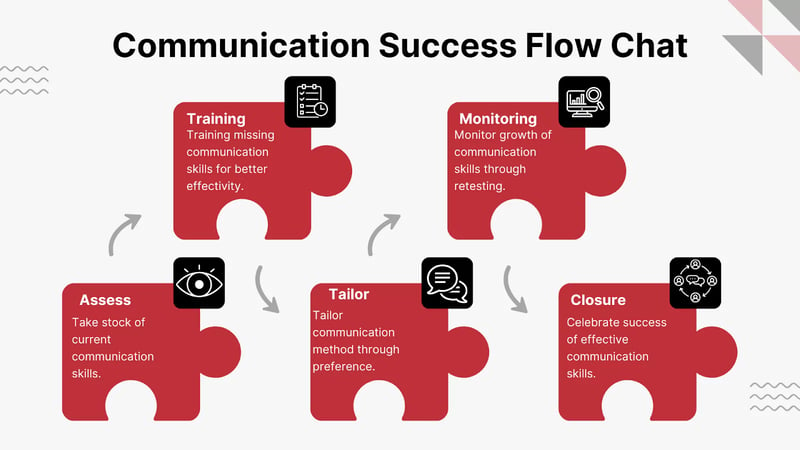6 Communication Strategies for Successful Marketing Managers
Effective communication is paramount for marketing managers to succeed in today's competitive business landscape. Whether it's conveying brand messages to target audiences, collaborating with internal teams, or fostering relationships with external stakeholders, communication skills are essential for driving marketing initiatives forward.
Want to upgrade your communication skills? This discussion will explore six key communication strategies that successful marketing managers employ to achieve their goals. Let's explore these strategies and how they can elevate marketing efforts in today's dynamic environment.

1. Business Writing for Successful Marketing
Business writing is a critical skill for successful marketing professionals, as it plays a central role in conveying brand messages, engaging with audiences, and driving action. Ideas should be articulated clearly and succinctly in emails, reports, briefing notes, and documentation. Align tone and language to each audience. Employ active voice, positive framing, and clear structure focused on key takeaways tailored to readers' interests.
Proofread thoroughly. Confirm understanding by summarizing the next steps and research hypotheses. It exudes confidence while inspiring consistency to create polished, reader-focused professional writing.
2. Reinforce Effective Verbal Communication
Reinforcing effective verbal communication is crucial for marketing managers to convey messages, build relationships, and drive results effectively. Effective verbal communication is crucial when presenting a marketing campaign, pitching a new product, or delivering a brand message.
Reinforcing effective verbal communication is crucial for marketing managers to convey messages, build relationships, and drive results effectively. Whether presenting a marketing campaign, pitching a new product, or delivering a brand message, strong communication skills enable managers to connect with audiences and drive impact. Marketing managers can learn all about upskilling through targeted training programs. With the fast pace of change in business, honing verbal skills is an investment that pays dividends in reach, influence, and outcomes.
3. Content Marketing for Engaging Audiences
Content marketing is a powerful strategy employed by marketing managers to connect with their target audience, establish credibility, and drive engagement.
While content marketing primarily focuses on providing value and building relationships, it also plays a crucial role in driving conversions and sales. Marketing managers strategically incorporate calls-to-action (CTAs) into their content to guide the audience toward desired actions, such as signing up for a newsletter, downloading a resource, or making a purchase.
4. Tailor Communications to Unique Audiences

Marketing managers should tailor messages to their audience. Avoid communication disconnects by tailoring messaging per audience, directly addressing their key concerns and goals using accessible language while respecting specific formalities. This audience-centric communication approach enables clearer understanding and increased buy-in across groups.
By addressing concerns and goals using accessible language and appropriate formalities, organizations can enhance understanding, foster engagement, and drive success across diverse audiences within the organization and outside.
5. Listen Actively to Identify Underlying Needs
Communication is a two-way street. Listening is as important as speaking effectively. Pay complete attention to fully understand others' views before responding. Avoid distractions and do not interrupt. Paraphrase input and ask insightful questions to determine true requirements versus surface statements. Identify knowledge gaps hampering progress. Once core needs are confirmed, provide tailored clarification, leading to mutual objectives.
By listening attentively, paraphrasing, asking insightful questions, and addressing knowledge gaps, managers can create an environment of mutual respect, trust, and collaboration that facilitates success for all involved parties.
6. Set Clear Communication Across All Channels
Communication Style |
Impact on Trust |
Key Strategies |
| Opaque |
Low trust due to lack of information sharing |
Strict need-to-know approach, withholding challenges/changes |
| Transparent |
High trust from context, insights into decisions |
Proactively share goals, plans, and metrics, and explain the rationale |
| Excessive |
Can cause confusion/uncertainty with too much info |
Lacking prioritization and filtering of non-critical info |
Prevent crossed wires by establishing communication guidelines across all channels. Marketing managers often manage different communication platforms. Establishing standard response times, preferred contact methods per context like urgent requests versus progress updates, required notification policies regarding delays, and protocols for ongoing projects.
Encourage transparency while respecting boundaries. Setting consistent bilateral communication standards drives productivity while building trust and psychological safety, enabling all members' voices to contribute toward shared success.
Final Takeaway
As marketing landscapes evolve, adapting and communicating effectively becomes increasingly vital. By honing these communication skills, marketing managers can inform strategies, inspire teams, engage partners, and amplify their impact in achieving organizational goals. Whether crafting compelling messages, fostering collaboration, or building trust with stakeholders, communication excellence lies at the heart of successful marketing endeavors.
Investing in communication skills is not just an option—it's necessary for marketing managers looking to thrive in today's competitive business environment. By embracing these communication strategies and continually refining their approach, marketing managers can position themselves as effective leaders, innovators, and drivers of success in the ever-evolving marketing world.
Frequently Asked Questions
Key communication skills for marketing managers include written impact, verbal influence, non-verbal awareness, audience tailoring, active listening, establishing open channels through guideline-setting, and leading dialogically.
Communication excellence enables marketing managers to align cross-functional teams, pitch compelling campaigns internally and externally, secure buy-in across stakeholders, provide mentoring, negotiate mutually beneficial partnerships, and amplify brand impact through verbal, written, and non-verbal means.
Marketing managers can tailor their messaging to address the unique styles, objectives, and knowledge of diverse stakeholder groups. Proactively setting consistent team communication guidelines around responsiveness, transparency, and confidentiality can also help ensure effective communication across all channels.
Marketing managers can enhance their verbal communication skills by honing influential verbal briefings and presentations using tone, emphasis, and active listening. They can also leverage non-verbal positive body language and visual assets to convey engagement and credibility. Investing in instructor-based training can improve communication strategies exponentially.
Key Takeaways
-
Craft polished written communications tailored to each audience's needs and formalities.
-
Hone influential verbal briefings and presentations using tone, emphasis, and active listening.
-
Leverage non-verbal positive body language and visual assets to convey engagement.
-
Recognize stakeholder groups that have unique styles, objectives, and knowledge requiring tailored messaging per audience.
-
Listen fully without distractions and ask insightful questions to determine underlying needs.
-
Proactively set consistent team communication guidelines around responsiveness, transparency, and confidentiality.
-
Marketing managers able to inform strategies, inspire teams, and engage partners communication-first will amplify impact.
This content is also available in:
- German: 6 Kommunikations-Strategien für erfolgreiche Marketing-Manager
- Spanish: 6 estrategias de comunicación para directores de marketing de éxito
- French: 6 stratégies de communication pour des marketeurs performant
- Italian: 6 strategie di comunicazione per manager di marketing di successo
- Romanian: 6 strategii de comunicare pentru managerii de marketing de succes
- Chinese: 成功营销经理的 6 个沟通策略

Opinions expressed in this article are those of the guest author. Aspiration Marketing neither confirms nor disputes any of the conclusions presented.








Leave a Comment